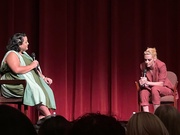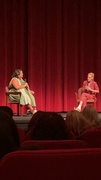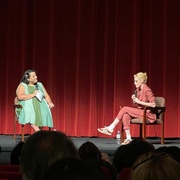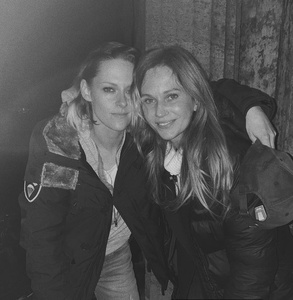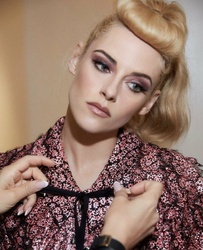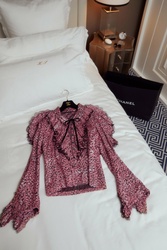Long read! We will keep this list updated as much as possible.
Film Enquiry If Netflix’s The Crown has re-ignited the world’s interest in the British royal family, that interest certainly peaked with the introduction of Diana Spencer during the hit series’ fourth season. For all of its storied historical prestige, no other member of the royal family has garnered the level of beloved obsession as the Princess of Wales. And because of that, Pablo Larraín‘s Spencer comes with heavy expectations, which gets lifted off into space with an affecting character study that is truly magnetic. Those who might’ve doubted Kristen Stewart’s performative prowesses in tackling such a monumental role will be proven wrong within minutes of watching this beautiful film. The gravity of this thoughtful narrative will take some more time for me to fully digest, but this is easily one of my favourite films playing at the festival this year.
Set during the Christmas holiday season in the Sandringham estate in Norfolk, England, the film follows Diana (Stewart) and her tense interactions with the royal family as she ponders annulling her marriage with Prince Charles (Jack Farthing). This three day holiday period results in her constantly budding heads with Major Alistar Gregory (Timothy Spall), who seems to watch her every move at the request of her royal majesty, the Queen (Stella Gonet). She finds solace in familiar faces, including her personal dresser Maggie (Sally Hawkins), chef Darren (Sean Harris), and of course, her two lovely children, Princes William (Jack Nielen) and Harry (Freddie Spry).
Knowing full well that Spencer is only a dramatic interpretation of Diana’s inner psychological turmoil, Larraín opens up the film with the following title on screen: “A fable from a true tragedy”. And what follows is a series of beautifully crafted sequences that possess a dream-like quality to them, which angles itself toward a truthful representation, without ever claiming to be completely factual. The film takes creative license in forming an emotional exploration of Diana Spencer, as opposed to a narrative exhibit that can be detailed within a chapter of a history book. And Larraín does this by carefully framing each scene with exquisite care, creating a portrait-like cinematic experience that does indeed feel like a fable. The use of symmetry by cinematographer Claire Mathon only complements the surface appearance of perfection inhabited by Diana’s public persona, which breaks apart as her personal trials are brought to life. Jonny Greenwood‘s score is beyond mesmerizing, which carries the film across variable terrains with ease. The soothing motif is interspersed with jazz-like transitions at times, which punctuates the film’s interpretative dogma. Mathon also has Petite Maman screening at the festival this year, while Greenwood has The Power of the Dog, making 2021 one of the most accomplished years for both these masterclass individuals (although Mathon has already experienced a similar year in 2019 with both Atlantics and Portrait of a Lady on Fire).
And one can’t talk about Spencer without praising Stewart’s performance, which deserves all the buzz currently going around town. Even though the film itself is perfectly crafted in so many other ways, Stewart sticks out as a crown jewel who simply carries each frame on her shoulders without ever missing a step. She channels a transformative energy that really goes beyond the usual portrayals of real-life figures, transcending our collective memories of who Diana actually was as a person. The interactions between Diana and Princes William and Harry are tenderly portrayed, providing a glimpse of the heartfelt sense of motherhood we have always associated with her, but rarely seen depicted. And this level of praise isn’t meant to throw shade at Emma Corrin, who does an excellent job in The Crown. Spencer as a piece of narrative art is just at a whole different level of interpretive storytelling, and almost requires a reset of expectations that draws on fact to create a unique version of fiction. Stewart is able to do this in what is certainly a career-best performance for an actress that has always been abundantly talented but often overlooked due to her roots as a highly commercialized figure in popular culture.
Many will be quick to compare Spencer with Jackie, which is a fair comparison, albeit one that carries little weight to it. Larraín might have chosen to highlight a high-profile historical female figure in both these films, but each stands on its own as unique entities. Spencer, in my opinion, is one of Larraín‘s most accomplished films to date and speaks volumes to his mastery of the cinematic language. Together with Stewart’s breathtaking performance, this is a film that truly demonstrates how cinema can elevate any story, no matter how familiar, in ways that no other artistic medium can.
Live For Film The beginning of Spencer, labels the film as “A fable from a true tragedy.” It takes place as the Princess of Wales arrives at Sandringham to join the Royal Family for Christmas. Diana (Kristen Stewart) shows up on her own after getting lost on her way from Kensington. She’s late, much to the dismay of Major Gregory (Timothy Spall), a new employee to the estate and a former Black Watch officer put in place to keep any paparazzi at bay, and also keep a close eye on the Princess. When she arrives she is told to sit on scales, her weight recorded. It’s tradition you see that each member of the family put on at least three pounds to prove that they enjoyed their Christmas. “Just a bit of fun.”
Diana takes every moment that she can to spend alone with her young sons Harry (Freddie Spry) and William (Jack Nielen), the one thing that seems to give her joy. She is also elated to find that the attendant and dresser assigned to her for these three days is Maggie (a wonderful Sally Hawkins), the one person to whom Diana feels she can speak freely. But the walls have ears in this house, and Diana herself seems on the brink of a breakdown. With staff concerned for her, and the Family keeping control of her every move, Diana finds small moments to try and connect with herself, to try and break free as everything else feels like it’s closing in.
If you’re reading this review it is likely that you have heard already about Stewart’s performance in this film, and anything you have heard is correct. She is absolutely transcendent as Diana, and it’s now her Oscar to lose. It’s not just the accent though that she achieves, but the mannerisms so characteristic of her subject. It would be easy to transform into a caricature, but Diana is so clearly respected that she is never treated as such. Stewart always portrays Diana with so much tension in her jaw and her shoulders, like she’s about ready to burst out of herself, that her body language elevates the pressure she feels.
Steven Knight, a 2004 Oscar nominee for Dirty Pretty Things, pens the script here, full of poignant and elegant dialogue. Coupled with Larraín’s intimate direction, Spencer thrives as the fable it claims to be, full of atmosphere and at times an even supernatural feel. The score from Radiohead’s Jonny Greenwood (who also did the music for The Power of the Dog) utilizes jazz elements as well as discordant tones, at times disorienting and stress-inducing, adding to the stressful surroundings Diana finds herself in. As is noted in the film, the media’s “lenses are more like microscopes,” and so is this film, an intimate portrait of a woman under extreme scrutiny, constantly being examined for every minuscule detail, each step and misstep. On the shoulders of Kristen Stewart’s transformative performance, Spencer hints at how this emotionally fraught existence led an extraordinary woman on the path to freedom from the oppression that confined her.
Movie Moves Me Everyone wants to be wealthy, live in a palace and be part of a royal family. Indeed, there’s financial independence but it’s the freedom that is often lost. Because every move of the royal family members will be under scrutiny, highly publicized and photographed by paparazzi. So before you wish to become one, look back at the fate of Princess Diana or Grace Kelly, known as Grace of Monaco, and ask yourself, is there anyone willing to pay the ultimate price, to become free?
“Spencer” is one of the toughest films I’ve seen in a very long time. Prince Charles’ infidelity with Camilla Parker Bowles has become public. The whole world knows the truth. The image of the life of happily ever after has scumbled. Princess Diana arrived at Sandringham alone. She drives the car by herself. By the time she arrives, everybody expects her to follow the rules; eat at a specified time, change dresses according to occasions. Overall, she must obey, obey and obey the rules. But the free-spirited Diana does not want that and will break every rule she can, to not go insane.
Written and directed by Pablo Larrain, the film is more like an artist at work, trying to paint the life of Princess Diana during Christmas time, her relationship with two her sons, Harry and William, with her personal attendant (Sally Hawkins) and the Black Watch Officer (Timothy Spall), the man who intends to keep paparazzi away. The camera follows Lady Diana from the beginning, trying to capture all sorts of emotions she produces along the way. What we realize quickly is that the Princess wants to have an ordinary life under extraordinary circumstances. She does not want the entire planet to talk about her dress, not to mention the palace.
The most heartbreaking scene is the exchange with Prince Charles when Princess Diana was discussing Prince Charles’ habit of hunting or keeping her children away. Prince Charles admits that he does not like the process itself. But when Princess Diana asks why, her husband says, “Sometimes you have to force your body to do what you hate for the sake of the country,” implying more on the two’s intimate relationship, Prince Charles appeared to hate it so much, but did it for the sake of the country. Watching that scene alone will make you wish that this kind of exchange had never taken place in real life. Because if it did, that’s something awful to hear from a husband or wife.
“Spencer” is a surreal and beautifully shot film that you won’t even notice the passing time. There is a strange feeling you will have throughout. It’s, of course, a Kristen Stewart show who showcases her massive talent as an actress. Her channelling Princess Diana was raw and flawless. With her performance, Stewart can be guaranteed as a frontrunner for the Oscar. Not just because of her name, her stature, or her army of fans that can increase Oscar’s live broadcast. But because Stewart delivered the performance of a lifetime of a persona bigger than life. Did Stewart give some kind of justification to Princess Diana? We will never know. Most of us never met her in person to be able to judge. But she captured how humane, kind and an ordinary human being Princess Diana was. That is something Stewart did in the best way possible.
Lastly, another part that’s being touched in the film is the unique and loving chemistry Princess Diana shared with her two sons. The way they looked at her and admired her. They saw her as a rebellion, as someone who would think twice before breaking the palace’s rules. Someone who did not deserve her heart to be broken. But despite Princess Diana’s inner struggle, on the outside, she was a humble person who gave her children, as you can judge by the film, everything a mother could give within those short amount of screen time they got in “Spencer”.
As for the film, it will go down as one of the most authentic films ever done about the Princess of Wales. The colors, costumes, photography and settings – in every scene, in every frame you will smell an Oscar. The script is so detailed and vivid, luckily, Kristen Stewart did not take it for granted. As an actress, she grasped the concept and acted on it as a master of the craft. Because there is no actress who would do what Stewart did. Despite me always being sceptical of Stewart’s acting ability, I am happy to be proven wrong any day of the time with the magnitude of performance I have witnessed in “Spencer”.
Films Fatale If the character of Maggie in Pablo Larraín’s latest film Spencer has taught us anything, it’s that women have each others’ backs. In a cinematic sense, this is true with how Larraín’s magnum opus Jackie operates as a dive into the grief of Jackie Kennedy, whilst Spencer tries to crack open the private thoughts of one Princess Diana. Jackie conjures up its own discussions based on real events and horrors, but Spencer takes this historical revisionist approach a few steps further by being quite fictional entirely. All in all, both works are sister films to one another, and you get a greater sense of what Larraín’s intention is when he selects real women of notable families who have had to deal with the scrutiny of the public eye, the weight of rules bestowed upon them, and the inability to feel pain in their own private ways.
In a way that will bother most royalists, the Chilean filmmaker allows Spencer to be enough of a fabrication of Diana’s life — particularly around the time of public rumblings about her marriage with Prince Charles. What if Diana spotted him having an affair, and she bottled up this heartbreak and devastation, as to appeal to her in-laws, and remain composed to the masses? What if we could see the nightmares she conjured up in her head, as if she was slowly going delirious from pressure? What if Princess Diana could say anything? She does just that, as the very first line that the Princess of Wales utters in Spencer is “fucking hell” (I believe), while she is lost on her way to her Christmas weekend getaway with her family. Those of you that expect a safe film are instantly warned that you won’t get what you want. Already, Diana is frustrated and fighting to keep her composure. It’s only harder from here.
That unnerving welcome comes from Kristen Stewart, who plays Princess Diana. You can feel safe. From the trailer that barely revealed anything, as if the promotional material was disguising a bad performance from us, it seemed like curious future viewers were apprehensive about this casting choice. Stewart has never been better. A major reason why this film is rated as highly as it is is because she nails every single scene, carrying the entire film entirely on her back, and being in complete control of her performance (as to not overact or carry out an impersonation over a transformation). At times, it’s clearly Kristen Stewart on screen, but in a good way (like we’re seeing the height of her signature style here, which shames us for ever judging her in the way that other actors with recognizable traits are usually adored). Otherwise, Stewart is occasionally completely transformed as the Princess of Wales — albeit her dark side that she rarely showed. Diana’s graces pop in and out during this time of distress, but Stewart also provides a genuine mysteriousness to her, as well as an interpretation of her frustrated and depressed sides.
She leads us through Larraín’s nightmarish take on Diana’s troubled psyche since the majority of the other characters — real or fictitious — won’t help in any way. Outside of the not-real roles of Maggie (who acts as a friend and helper for Diana) and Equerry Major Gregory (as well as her children, Princes William, and Harry), everyone else exists just around her, either digging into her soul (through piercing glances or Charles’ savage tone) or acting as their own ornaments. I rarely state this, since I really don’t think it matters, but these characters barely resembling their real-life counterparts is distracting enough, mainly because they barely (or never) speak (outside of Prince Charles), so we can only reflect on who they are visually. Still, Stewart’s dynamic performance, as well as the many artistic and thematic achievements, pull us by these perplexing choices.
The last time Larraïn had an English-language film, he worked with Mica Levi on a score for the ages. This time, he brought on board Jonny Greenwood of Radiohead fame (as well as the musical mastermind behind the scores for various films, including Paul Thomas Anderson’s The Master, Phantom Thread, and Greenwood’s musical opus There Will Be Blood). We get the best of both worlds here, with Greenwood’s affinity for classical music swirling around you (literally at times, with the plinking and pattering of percussive or string sounds flittering around your head), as well as his knack for making you feel sick to your stomach (his eerie strings are back). This feels like the prestige surrounding Diana coming crashing down, as if we’re fighting to live a regal life whilst collapsing under the spotlight.
In the way that Greenwood’s score circles about, and Princess Diana suffers repetitive fates, Spencer is as cyclical as it is symbolic. We begin with a shot of a dead pheasant on the road, which predicts the shooting that Charles and the boys do later on in the film (as well as Diana’s acknowledgement that these birds are being brought up just to be killed for sport, much like many public figures). We also get the gist of Diana’s surroundings in other ways, like the obvious sign for the employees in the basement below that the entire building can hear anything that they do; the same is true for Diana, who can’t even mutter under her breath in a room alone without the world scorning her. One of my favourite metaphors is the snooker table when Diana and Charles exchange choice words. Here is a game where every move matters, and the slightest of mistakes will cause great penalties.
Throughout Spencer, Diana is haunted by the metaphorical ghost of Queen Anne Boleyn, who was executed for treason, as if Diana felt like she had to tip toe every second of her life: it’s Prince Charles that was destroying the marriage, but surely it would be her that would be thrown to the wolves. These fears turn into hallucinations, which begin as scenes that will throw you off course, and plunge into full-on visions that transcend time and space. If Princess Diana has to endure her own battles internally, she can explore her own escapes just as vividly. It’s these experimental deviations from your traditional period piece biopic that help Spencer even more. We couldn’t care less about the people around her judging her. However, we want to know what she is experiencing, even if her darkest hours frighten us: thoughts of death, her struggles with bulimia, and the feeling of choking from that damned pearl necklace that’s now stained with adultery.
Hearing Princess Diana’s secret desires (even if they’re not real) makes us feel closer to the late icon than ever before. Knowing she just wants to have some fast food, enjoy life again, and be away from any royal position makes her mental and physical jail cells feel all the more suffocating. We never once see paparazzi, but we know they’re there, regardless if the curtains are shut or wide open. Even we invade her privacy by seeing shots of her showering (and in other vulnerable positions). These moments of insecurity amidst her dream sequences make us unsure of what is actually happening, and often times you may find yourself wrong. At the end of the day, Princess Diana just wanted to be happy, free, and with her sons, away from the hell she didn’t foresee. Pablo Larraín grants her this even briefly in Spencer, his latest triumph, but not before allowing us to experience her pain firsthand. - 5 Stars
Slashfilm Princess Diana wanders through the ornate but empty halls of the Sandringham Estate, a living ghost in an expensive gown. She drifts, she sways, she dances. She is haunted by a million different memories and the anxieties of what might come. Not far from here, her family home still stands – abandoned and boarded up like a haunted house. A little farther from that, a scarecrow stands in an empty field. When she first arrived here, the scarecrow was clad in one of her father's jackets. She is surrounded by people in this sprawling castle-like building. And she is alone.
Pablo Larraín's "Spencer" follows Diana, as played by Kristen Stewart, during one long, terrible Christmas weekend with the royal family. We seem to be inundated with Diana-themed dramatizations lately. Diana finally arrived as a character on the most recent season of "The Crown." There's a musical about her headed to Netflix. And then there's "Spencer," a haunting, melancholy film about a royal on the verge of a nervous breakdown. Larraín's film begins with a bit of text telling us this is "A fable from a true tragedy." The "fable" angle implies that this didn't really happen — at least not exactly as it's portrayed here. But it feels real. It even feels real when things dip into the surreal.
Diana is an outsider. She was wealthy by birth, of course. And her father was a nobleman, the 8th Earl Spencer. But as presented here, and in other dramatizations of her life, she never quite fits with the royal family she marries into. Her marriage to Prince Charles may have produced two sons, but it was seemingly loveless, ending with divorce. Perhaps when the relationship first began, Diana was able to fake it until she made it, politely trying to integrate herself into the family. But by the time we meet her in "Spencer," that's no longer a possibility. She's utterly alone — she drives herself to the estate while the other royals all come in a gaggle. And she's unable to keep up a mask of contentment, or even sanity. She seems as if she's one bad moment away from completely losing her mind.
"Spencer" is a kind of companion piece to Larraín's "Jackie," which followed another historical female figure struggling over a period of a few terrible days. But they are ultimately quite different stories. "Jackie" was the tale of a woman embracing tradition and ceremony in grief, as she stages an elaborate state funeral for her murdered husband. "Spencer," in contrast, is about a woman who is suffocated by ceremony. There are rules to being a royal, and Diana can't seem to grasp them. When she arrives for the weekend, she's immediately asked to get the ball rolling by taking part in a "fun" tradition — those attending the Christmas weekend getaway must weigh themselves when they enter and then once again when they leave, to see who gained the most holiday weight.
The implication is that if you've packed on a bunch of pounds feasting on sweets you've had a grand old time. But Diana, who suffers from an eating disorder, wants nothing to do with this. Her stance against the weighing is blunted by the all-seeing Major Gregory (Timothy Spall), an equerry who has been ordered to keep an eye on Diana. In Gregory's eyes, and the eyes of those he serves, no one is above tradition. Later in the film, he tries to explain to Diana why he's such a stickler for the rules: they're for the good of the country. Or so he believes.
Stewart adopts a breathy, posh accent to play the princess, and whether or not she sounds exactly like the real Diana is immaterial. It's the physicality Stewart brings to the part that turns her Diana into a living, breathing being. She fidgets, she toys with her hair and jewelry, she breathes heavily. She is a woman unable to be comfortable around others. This is a raw, brilliant performance, so entirely embodying the character that it starts to seem less like acting and more like possession. Stewart has never been better than she is here.
While the royals aren't presented as overtly cruel here — save for Charles (Jack Farthing), who is constantly staring daggers into his wife — they're not exactly warm, either. They simply cannot understand Diana. They can't fathom what's going on in her head. And while they can clearly see she's unwell, they seem to write this off as a woman being overly hysterical. Charles calls her a spoiled child who wants attention, and chastises her for leaving her curtains open in her bedroom, lest someone looks in. But attention is the last thing this Diana wants.
There are those within the walls of Sandringham who offer kindness to Diana. There's Maggie (Sally Hawkins), a dresser who is warm enough to Diana to have become a confidant. There's the head chef, played wonderfully by Sean Harris, who tries to offer helpful advice to Diana as she spirals. And then there are Diana's two sons, who clearly love her unconditionally, and also try to help her pull herself together long enough to make an appearance at one of the many, many fancy dinners that happen over the Christmas getaway. But these brief kindnesses can't remedy Diana's stormy mind, or calm her nervous heart.
Diana is haunted, emotionally, mentally, and even literally. She finds herself seeing the ghost of Anne Boylen, the Queen of England who was beheaded by Henry VIII after he decided he wanted another wife. Diana sees herself in Anne — her husband, too, is in love with another woman, and not shy about hiding it. And while Diana may not run the risk of literally losing her head like Anne, she is in serious danger of losing her mind. Larraín represents this with surreal touches, like when Diana imagines she rips off a pearl necklace Charles bought for both her and his lover. The scattered pearls fall into a bowl of soup that looks exactly like the stuff Linda Blair vomited up in "The Exorcist," at which point Diana digs in her spoon, bringing a green-coated pearl into her mouth and biting down on it with a terrible crunch.
And whenever she eats, she runs off to the bathroom to purge. She cuts her skin with bolt cutters — or does she? The wound vanishes, but later, someone comments that she's been "cutting herself again." What's real and what's part of Diana's fractured mind is always in question, resulting in a dreamy, strange atmosphere. Claire Mathon's cinematography is foggy and faded and lush, giving the entire movie the look of something long lost but now remembered. And Jonny Greenwood's score is unnerving, horror movie music in disguise.
"Spencer" is an ultimately sad film, but that's not to say it's a non-stop misery train. While we all know the eventual tragedy that will befall Diana, there are glimmers of light that peek through, just like the light Diana struggles to find when servants sew up her bedroom curtains after she keeps refusing to keep them shut. One of the film's final moments, which involves an unexpected pop song, is so wonderfully light, like a sudden cool breeze on a stifling day, that it radiates a kind of wholesome power.
Stewart's Diana is an unhinged, hopeless, lonely tragic figure in a desperate search of some sort of friendliness, some sort of understanding, some sort of love. And she will eventually find it, however fleeting. But the fleeting moments are the ones that often end up meaning the most to us. The ones who tuck away in our hearts, keeping them there like an ember of fire ready to be stoked. "Spencer" will break your heart, but it will bring it warmth, too. - Film Rating 9/10
Awards Radar Wow. I have seen the performance of the year. In fact, I also think I may well have seen the film of the year. The last movie II saw on the ground in Canada is the crowning (no pun intended) achievement of 2021 right now. Capping off my in person segment of the Toronto International Film Festival, Spencer is a stunning achievement. Not just a brilliantly engaging character study, it also gives Kristen Stewart the opportunity to blow you away. If you’ve been a fan of hers for years, this is the culmination of years of strong work that went below the radar. If you’ve been a detractor, this is the turn that will get you on board with her. Stewart blew the roof off of TIFF and she’s coming for Oscar next.
Spencer is not your garden variety biopic. Instead, it’s a self-contained, somewhat fictionalized, and deeply impressionistic look at Diana, Princess of Wales. In some ways, it functions as a ghost story. Presented her as a fable about a real life tragedy, it very much plays that way. Those seeking traditional historical fiction will be disappointed (The Crown, this is not), but something unsettlingly perfect emerges instead.
Taking place during the Christmas holiday, we see the Sandringham estate in Norfolk, England, setting up for the arrival of the royal family. It’s done with military precision, and in fact, in conjunction with the military. As that procession is occurring, Diana (Stewart) is lost on the back roads. Clearly dreading the annual event, she’s almost happy to be away. Found by the head chef (Sean Harris), it’s quickly shown how she’s an outcast to the family, looked over with almost pity by the staff, and only shown affection by her sons, William (Jack Nielen) and Harry (Freddie Spry). The Queen (Stella Gonet) barely acknowledges her presence, while her husband Charles (Jack Farthing) resents her not going along to get along. During this holiday, she might as well be a prisoner, especially as she’s repeatedly denied the chance to go visit her childhood home.
While others murmur about Diana, she has a friend in dresser Maggie (Sally Hawkins). This season has also brought a supervisor to the staff in (Timothy Spall), who Diana is unsettled by. It’s clear that she’s working through the end of her marriage, while struggling with the box being royalty has put her in. As is said in the film by Diana, the royals don’t have a future, while their past and present are one and the same. Suffocated by that, we watch as she lashes out, desperate to be an individual.
Kristen Stewart deserves to win the Oscar for Best Actress, full stop. Disappearing into the role of Diana, there isn’t a moment in Spencer where you’re seeing Stewart. It’s only the Princess of Wales. It certainly doesn’t hurt that some of the paparazzi elements and external pressures laid at Diana’s feet resemble things the actress has gone through, but it’s still a performance for the ages. Tightly wound but full of personality, she shows you why this human being captured the imagination of so many. Especially in one particular sequence, she makes the woman truly come alive. The supporting cast is solid, with Sean Harris, Sally Hawkins, and Timothy Spall having their moments, but they’re decidedly in the background. Also on hand is Richard Sammel, among others, but this is rightly all about Stewart.
Pablo Larraín worked wonders with a similar idea in Jackie, and he again strikes gold here with Spencer. The director, armed this time with a Steven Knight screenplay, makes sure to keep the focus on his leading lady. This feels both more and less stylish than Jackie, but interestingly, he’s hit on a more hypnotic protagonist. The score from Jonny Greenwood evokes a ton, while Knight gets somewhat literal with his metaphors (the Anne Boleyn elements walk up to that line), though things never become pretentious. Larraín is often studying Stewart from the director’s chair, courtest of Claire Mathon‘s cinematography, which mixes quite well with how Knight is pondering Diana. Then, there’s the finale, which features a perfect musical selection, as well as a brilliantly earned release of emotion. For something that traffics in an known eventual tragedy, the final moments are literally filled with joy.
Awards-wise, Spencer should be a major player for Kristen Stewart. Throughout the season, she should be a force in Best Actress. Aside from Actress, it’s hard to say. Best Picture citations are worthy, but is it a bit obtuse for Oscar? Keep an eye out for Larraín in Best Director if not. Below the line, Jonny Greenwood’s score in Best Original Score should be one to watch out for, as it’s more brilliant work from him.
Spencer won’t soon be forgotten. Not just because it brilliantly ponders a figure so many still think about, but because it showcases a performance for the ages from Kristen Stewart. TIFF had a ton of good flicks, but nothing compares to this one. It won’t be for everyone, but everyone should give it a chance. NEON has another idiosyncratic masterpiece on their hands, as well as an Academy Award vehicle for Stewart. -SCORE: ★★★★
Awards Watch One of the best films of the 2021 Toronto International Film Festival, Pablo Larraín’s Spencer is a perfect example of how imagined fables within the context of real-life events such as those witnessed by Princess Diana can create remarkable viewing experiences and draw us closer to feeling, rather than knowing, what it’s like to constantly live in the public eye.
It’s what makes Spencer truly stand out from other, much more conventional, biopics. Never attempting to document but rather narrate, the film wonderfully blurs the lines between the factual and the imagined, inviting us to go beyond questioning whether what we see on screen is actual, and persuading us that, while this is clearly a fable with bits of imagination weaved into uncomfortable truths, it is certainly possible; and that regardless of accuracy, it’s true to how the Princess of Wales must have felt at certain pivotal moments in her life.
Clearly mentioning from the outset that what we’re about to watch is not a standard rundown of Diana’s life, Spencer is a film brimming with confidence, elegance and meticulous attention to detail. Orchestrated to look like we’re finally experiencing Diana’s own viewpoint, the film shifts almost feels claustrophobic to great effect: in constraining most of what goes on screen within Diana’s troubled perspective, it grips our attention and never lets go. This narrative device particularly works especially well at a time when standard biopics have almost created a sort of storytelling template which Spencer gloriously shatters.
Comparisons will certainly be drawn to Larraín’s Jackie – but this is a finer, more assured examination of the person behind the personality, the agony behind all the lavishness of attire and makeup, the stirring emotions of being imprisoned, isolated and, to a large extent, ostracized. A beautiful picture on the price of being different, the daringness of being yourself in a system that simply would not take that for an answer, the realization that one’s true self is diminishing by day at the expense of putting up with appearances and the heartbreaking cry for help that no one seems to want, or be able to, listen to.
From Claire Mathon’s gorgeous cinematography perfectly evoking the sense of time and place, and the camera movements that capture Diana’s suffocation, to the spectacular costume design by Jacqueline Durran, and the immaculate production design by Guy Hendrix Dyas, everything works here in perfect harmony to achieve Larrain’s vision.
As Diana, Stewart is a revelation. A brilliant casting move by Larraín, Stewart’s acting style perfectly suits the director’s version of Diana. Trapped in an unforgiving environment that demands nothing but conformity and worship of tradition, something Stewart knows a bit about in her career, she captures Diana’s isolation and torment, channelling her fantastic abilities to communicate Diana’s awakening and realization that she can no longer support becoming a brand for media consumption, an icon for public appeal and a carefully calibrated royal that the Palace deems appropriate. Diana’s urgent need for liberation, rebellion and going back to who she really is, is delivered superbly by Stewart who goes beyond a pitch-perfect accent to embody Diana’s state of mind and capture her psyche rather than going for mere mannerisms and imitation.
Bottom line: A smart, moving and sophisticated reflection on what it feels like to never fit in, to constantly feel like an outsider and to have your life on public display, Spencer stays true to Diana without resorting to the factual, showing us that even when you can imagine rather than document, you can always hit the right notes if your approach is in strong sync with who your subject truly is. - Grade: A
Earth to Films Pablo Larraín and Kristen Stewart work wonders together in Spencer. A portrait of a beloved icon is painted in a thoughtful, curious, surreal way. The film has an abundance of character and wit. The clarity in Larraín’s vision, coupled with Stewart's laser-focused performance as Princess Diana, make for a resonating psychological drama. The story takes place over the Christmas holidays in 90s England, at a point where Diana’s marriage to Prince Charles is crumbling and the world around her grows even more coldly watchful. The film is not confined within a typical biopic structure; rather than land on all the traditional points about a real-life figure, Spencer experiments with style. Stewart delivers her most accomplished work to date as she absorbs the essence of Diana. It’s a brilliantly unexpected performance that reveals more layers of wit, poignancy, and delightful awkwardness as the film unravels alongside her.
Contrasting the pastel palette of the palace is an often spooky-looking exterior, with coats of fog and a haunting depiction of Diana’s old home. With stunning cinematography by Claire Mathon and a rich score composed by Jonny Greenwood, the film looks and sounds gorgeous. Aspects from the costume design to the hair and makeup are subtly done, completely in tune with Larraín's assured vision. Captured at a time when Diana has been in the royal family for nearly 10 years, the film lives imaginatively inside her head as she experiences mental exhaustion, wanting so desperately to break free. Stewart's haunting, playful performance powerfully carries the narrative to fruition. Alongside strong supporting performances by Timothy Spall and especially Sally Hawkins, who shares a delightful scene with Stewart nearing the film's close, the ensemble work like magic. The blend of realism with surrealism gives Spencer a distinct perspective that stands out as its own creation from other portrayals of Diana.
One Movie Our Views Chilean filmmaker Pablo Larraín reinvigorated the biopic formula in 2016 with Jackie, offering a complex portrait of Jacqueline Kennedy in the days following her husband’s assassination, featuring a bravura performance by Natalie Portman. Now Larraín pulls off a similar magic trick in Spencer, which similarly hones in on a very specific stretch of time in the life of an iconic figure, and casts Kristen Stewart in a career-defining performance as Princess Diana.
The film, which is as much a psychological portrait of the Princess of Wales as it is a royal drama, unfolds over three days at Sandringham Estate in Norfolk, where the Royal Family is gathering for Christmas. The year is 1991, and Diana (Stewart) has secretly decided that she wants to divorce Prince Charles (Jack Farthing), whose infidelity has become the point of tabloid fodder. Diana is on the outs with the family, but is keeping up appearances for the holidays.
As such, the family is watching her closely to ensure she doesn’t cause public embarrassment, even hiring a former military officer (Timothy Spall) to monitor her every move, heightening her growing sense of paranoia. But Diana finds ways to rebel. We first meet her driving herself to the estate in a convertible and arriving fashionably late. She challenges the status quo of what clothes she is supposed to wear, what food is supposed to be eaten, and questions annual traditions such as the pheasant hunt.
Stewart is transformative and moving in the role. Not only is it an uncanny impersonation, with her blonde hair, mannerisms, and English accent being spot-on, but it’s an excellent performance as well, with Stewart bringing depth and emotion to her portrayal of the iconic figure. This is very much a character study of a woman being driven mad by the public spotlight. Stewart’s Diana is suffering from bulimia, seen at several points with her head in the toilet bowl, and engages in other forms of self-harm as well. But her portrait of a disillusioned princess is also surprisingly funny at times, using sardonic humour as a way to cope with the demands of her life.
The screenplay by Steven Knight provides a number of humanizing, character moments for Diana, including some wonderful scenes with her two young sons William (Jack Nielen) and Harry (Freddie Spry). Knight’s script also provides a couple of rich supporting characters for her to converse with, including an assistant (Sally Hawkins) and a chef (Sean Harris). Harris brings a good deal of empathy to his role, with a touching moment in the kitchen, and Hawkins has one scene in particular at the end that is quite beautifully written and performed.
The film unfolds as a tense chamber drama laced with elements of a psychological thriller. The estate itself looms in the frame like the Overlook Hotel from The Shining, with its long hallways that Diana briskly walks down setting the stage for a different sort of madness setting in. The excellent jazz score by Jonny Greenwood gives the film the feel of a thriller, with a haunting motif that keeps being revisited on different instruments.
The film is gorgeously shot by Portrait of a Lady on Fire‘s Claire Mathon. Many of her images have a stately, regal quality to them, matched by a sense of foreboding. There is a haunted quality to the way she shoots the estate and its grounds at times, suggesting the presence of figurative and literal ghosts, including the hallucinatory vision of Anne Boleyn (Amy Manson) that Diana starts seeing roaming the halls. Mathon’s cinematography is complimented by the film’s immaculate costumes and production design.
The opening subtitle calls it “a fable from a true tragedy,” and Spencer is a tragic portrait of a woman unraveling as she is put under the microscope of public scrutiny. But, through the film’s incredibly poignant final scenes, Larraín also gives her a much deserved happy ending. The tears that flow are a cathartic release from the intensity of everything it follows, and also a sombre reflection on what we know is to come. Larraín has crafted a perfect companion piece to Jackie, delivering another powerful and intimate portrait of a public figure over a few defining days. - 4/4 stars
Polygon The Princess Diana biopic Spencer isn’t your prototypical biographical film. Then again, the film’s director, Chilean auteur Pablo Larraín, isn’t known for making familiar biopics, either. His depictions of Jackie Kennedy’s life after John F. Kennedy’s assassination in Jackie, and poet Pablo Neruda on the run from new Chilean president Gabriel González Videla in Neruda, are raw, unflinching films that focus closely on a specific moment in their subjects’ lives.
Likewise with Spencer, Larraín doesn’t provide the expected Princess Diana story. There’s no courtship or fairy-tale wedding, à la The Crown. It doesn’t chart her life from being a newborn fated for greater heights. Nor does it affix her as a predictably doomed victim. Instead, Spencer takes place during a Christmas weekend in 1991, at the Queen’s Sandringham estate. Diana (Kristen Stewart) is still in a fraught marriage with Prince Charles (a cold Jack Farthing), or at least partially. During her stay, Diana contends with her role as a mother to her two sons, William (Jack Nielen) and Harry (Freddie Spry), and faces her eating disorder, her family’s history, and the domineering men who script her daily life.
Opening with a title card reading “A fable from a true story,” Larraín’s film isn’t based on a wholly true event. Nor does it want to tell Diana’s life story. Spencer is an act of psychological horror, a kind of ghost story, and a survivalist picture carried by an uncannily immersive Kristen Stewart, in the best performance of her career.
Stephen Knight’s script doesn’t bang viewers over the head with the media-constructed people’s princess mythos. Knight and Larraín are too smart to use such easy tools. Instead, they find subtler ways to weave her legend into a realistic narrative. Spencer opens with Diana, without a chauffeur or bodyguard, driving herself to Sandringham House. The confident royal loses her way, ultimately deciding to stop to ask for directions. In front of normal folks, she assumes a shy, somewhat vulnerable disposition. Her eyes swing skyward as her head tilts to the side. The scene is the first contour in Stewart’s layered portrayal of her: the differences between the private princess and the public-facing one.
This is a biopic acutely concerned with parsing Diana’s psychology, and specifically, her many demons. But not in a salacious way. While heading to Sandringham Estate, she sees a scarecrow standing in the middle of a field, wearing her father’s red coat. (In real life, her father, John Spencer, died three months after that Christmas, of a heart attack.) She goes to retrieve the outerwear, hoping to have it cleaned. Diana grew up on the Queen’s estate in Park House, making her journey to the Christmas festivities both a heartening homecoming and an unfortunate duty, causing a wellspring of grief to affect her in varying fashions.
Diana also connects with her ancestry in the film. Equerry Major Gregory (a punchable Timothy Spall), a craggy Scottish war veteran who now narcs for the Queen, pesters Diana to conform to tradition. One “game” has visitors weigh themselves at the beginning on arrival, to see who gains the most weight over the holidays. This tradition causes Diana’s insecurities with her weight to bubble to the surface. And after she finds a book about Anne Boleyn on her bed, possibly placed there by Major Gregory, she dreams of the distant relative, the second wife of Henry VIII, who was beheaded after he falsely accused her of adultery. Between the coat and the spirit of Anne Boleyn, Diana is drawn toward her now-condemned childhood home.
Who can blame Diana for feeling locked-in? Other than her tailor and best friend Maggie (Sally Hawkins), and the estate’s sympathetic chef Darren (Sean Harris), she’s pretty much isolated. But once again, Larraín is too smart to limit Spencer to honing in on Diana’s relationship with the other royals around her, or even her relationship with Charles and his mistress, Camilla Parker Bowles. Instead, he pulls focus by depicting how Diana is trying to protect her sons from the royals’ archaic, closed-off traditions. But in the face of domineering men like Charles and Major Gregory, along with the unbending protocol of the estate and her eating disorder, she can barely protect herself. The mania she feels makes her Christmas holiday more of a fight for survival than a getaway.
Jonny Greenwood’s score opens as classically British, then morphs into an unnerving symphony. Following a similar aesthetic to Jackie, cinematographer Claire Mathon (Atlantics, Portrait of a Lady on Fire) captures Diana with intrusive close-ups, her lens peering over the princess’ heart-rending facial expressions. Mathon also takes great interest in the disturbingly manicured features of the estate: the uniform garden, the exacting movements by the austere servants, and the meticulously prepared food and clothes, which contrast with Diana’s freefall. Meanwhile, the costume work by the legendary Jacqueline Durran covers a greatest-hits of Diana’s best-known outfits, with an evocative array of fashions that often speaks toward her mental state.
But Stewart’s absolutely outstanding performance is what pulls together Diana’s lore and Larraín’s conception of her, creating a fleshed-out version of the princess that isn’t reliant on broad or showy instincts. Stewart folds in her body to actualize Diana’s nervousness, tips her head in a familiar way, and gets the princess’ voice pitch-perfect. But beyond that, her performance comes down to the eyes. Stewart’s eyes swing like switchblades through the grass. And each glance claims another victim, displaying either a kind of forlornness or a shyness, depending on the situation. It’s her eyes that jump her over the line of performance to a totally lived-in aura. There’s never a moment where it’s Kristen Stewart as Diana. She is Diana.
The film has two climaxes, and one comes when Diana finally makes it back to her childhood home. She’s frantic and hallucinating, and Mathon’s camera closes even more perilously into her. This is where Jackie editor Sebastián Sepúlveda shines, providing a vivid and haunting montage of her life leading up to the moment. The other climax flips the tenor of the film from grim to celebratory. Considering the gloominess of the film, and how deep into despair it descends, the quick upshot toward revelry should feel maudlin, almost like Larraín is cheating against history. But it works, because the director knows the audience has an inherent desire for Diana to have a happy ending.
In that sense, Larraín’s Spencer, an inspired portrait of the princess’ life that’s more concerned with finding new truths in her public and private persona than following the familiar beats of her life, isn’t the classic biopic audiences are used to watching. But it is the inventive, iconoclastic film Diana deserves.
Mr Will Wong Kristen Stewart and Director Pablo Larraín do Princess Diana justice with Spencer.
It follows Diana over her final Christmas with the royal family. She arrives at the mansion willing to comply with the strenuous rules the family demand over the holidays. But as the long days and night tread on, Diana begins suffocating in the life she lives. Over the three days of Christmas Eve, Christmas Day and Boxing Day, Diana decides to break free. The Filmmakers have stated this Film is a mix of history and speculation. This is further clarified with the opening title cards that read the film is “A Fable of a True Tragedy.”
Screenwriter Steven Knight refreshingly puts the focus on Diana instead of the royal family and gives a rounded look at the Princess of Wales. There are difficult to watch scenes of Diana binge eating, purging, and self-harming. These are matched with heartfelt intimate moments of Diana with her sons, showing the immense love and bond they shared.
Ever the master of atmosphere, Larraín covers the mansion in a thick, dense fog that envelopes the grounds like dread. Like his previous film Jackie, long tracking shots follow Diana walking or running. It’s here we see the depth of the physical change in stature and stride Stewart has made to embody Diana. One beautiful moment comes in a montage of tracks that pays homage to Diana’s love for dance. Additionally, his close-ups mirror the claustrophobia, horror and immense pressure Diana felt. Diana’s inner world is further highlighted by one of the best Scores of the year from Radiohead’s Jonny Greenwood.
Yet, none of this would work if it wasn’t for Stewart. She embodies Diana while refreshingly making her, her own. She fully encapsulates the suffocation Diana felt, and expertly expresses both desire and fear in leaving. It’s truly one of the best performances of the year. She’s joined by Timothy Spall, who gives a textured performance as staff hired to keep an eye on Diana. And the charming Sally Hawkins, who plays a personal attendant to Diana, is delightful to watch. Particularly, in a scene towards the end, she shares with Stewart.
Overall, Spencer is a perfect balancing act of history and speculation, is impeccably shot, and showcases a top-tier performance from Stewart. Even if you take away the fact that it’s about Diana, this Film works as a story of a woman reclaiming control and agency over her life.
NY Post Director Pablo Larraín took a big gamble when he cast Kristen Stewart in a role as weighty and revered as Princess Diana.
The Chilean’s game of royal roulette has paid off.
Because Stewart, who we’ve always known is scores better than the average-to-wretched scripts she’s so frequently handed — “Twilight,” “Snow White and the Huntsman,” “Charlie’s Angels” — is haunting, playful and blisteringly human as Di at the end of her rope.
Her princess is a broken woman so alive with promise and love and humor, but held back by mummified royals who only scold and sneer, and an unfeeling, slimeball husband. All she has in the world are her two boys, who worship their mum. The tragedy is that every millisecond of the movie, we’re fully aware of the fate that will befall this young mother.
Stewart is the star of “Spencer,” a dream-like movie that had its North American premiere Wednesday night at the Toronto International Film Festival. The evening was easily the most electric of the entire week, and brought the audience back to the good old days — most seats were full, there was rousing applause at the end and film buffs loudly analyzed every moment on the way out. As it should be.
The unconventional drama, which takes place over an imagined Christmas at Sandringham shortly before her and Charles’ divorce, is one of several films and TV shows resurrecting Diana lately, including “The Crown” and “Diana the Musical,” which is coming to Broadway and Netflix in November.
“Spencer,” by a long shot, is the most fictional of them all. Through its fibs, however, the movie manages to be the most honest and probing take, and gets to the meat of what was tormenting the People’s Princess better than any simple historical retelling ever could.
Larraín’s 2016 film “Jackie,” which starred Natalie Portman as a mourning Jackie Kennedy in the aftermath of husband John F. Kennedy’s assassination, took a similar tack. The director likes to use enormously famous women to explore grief and survival in the spotlight. His movies, while sly and clever, are almost like operas in their emotional heft. In his vision, Diana obsesses over “off with her head!” Anne Boleyn — seeing herself in Henry VIII’s wronged wife. I kept thinking about Donizetti’s “Anna Bolena.”
The director has other theatrical tendencies. In one fantasy sequence — one of many — Diana rips off her pearl necklace at dinner, the pearls fall into her bowl of soup and she eats them. The jewelry crunches against her molars. It’s freakin’ weird, yes, but you get it.
What you’ll also get from Larraín’s moody film is a glimpse at how Diana was feeling shortly before her marriage fell apart for all the world to see. You will not be treated to a historical rundown of actual recorded events. And, unlike Peter Morgan’s “The Crown” and “The Queen,” you will not get a sympathetic, “isn’t she wonderful!” Queen Elizabeth II. We view the world from Diana’s perspective, so goodness emanates only from her children, William and Harry, and the servants she’s closest to (Sally Murphy beautifully plays one named Maggie.)
In one scene, late for yet another palace meal, Diana turns to her adoring kids and says, “Will they kill me, you think?” Steven Knight’s script ain’t trying to be nice.
Stewart won’t win the Best British Accent trophy at the Kids’ Choice Awards, and the film is not what we’ve come to expect from palace intrigue dramas, or any historical Oscar bait, really.
But of all the Diana projects out there, this is the one the late Diana Spencer would want you to see.
The Underscene From the very first frame of Pablo Larraín’s Spencer, Diana stands out in the sea of monotone colours that is the Royal Family. Whether it’s a bright red coat or a yellow skirt, she is impossible to miss amongst the brown and grey of the members of her family. No matter how much she would love to not, everywhere she goes she attracts attention. The lights that never stop shining on her, the cameras that are always there, mostly unseen and yet implied, constant supervision she can’t escape. And yet, she just wants to be normal, to escape. To become just another monotone colour amongst the world. And yet, we all know too well that, even after escaping, that will simply never be the case.
Everything in Larraín’s filmography has led him to direct this film. This is the product of a director at the height of his craft, from the very first frame to the last, he is in perfect control. Everything in Spencer has a purpose. Nothing is left to chance, the precise script and direction prove that this was the film that Larraín has always meant to direct. Everything before that was just a prelude for this film.
Spencer follows the Princess of Wales (Kristen Stewart) as she navigates a precarious Christmas holiday with the Royal Family at their Sandringham estate in Norfolk — a moment that will set Diana on a path to independence, however tragically short-lived.
Diana’s story is one of tragedy, one that we all know how will end. Spencer never claims to be the truth, the film opens with it saying that it is a fable, making it clear that this is an interpretation of the weekend that would lead to Diana choosing to leave. A choice that would eventually lead to her death, a choice that she made to save her life and in the end, didn’t change anything.
I have sung the praises of Kristen Stewart for years, making sure that people would stop judging her just because of the Twilight films. If anything, Stewart has developed an impressive filmography since stepping away from the role that shot her to stardom. She has proven time and time again that she is an actress of incredible calibre and her turn in Spencer is proof that the actress is more than capable of transforming when she needs to. Her performance is one full of nuance and incredible restrain until she just breaks everything and lets herself completely loose. It’s a performance that will completely captivate you, a performance that will earn her not only recognition but also awards in the process.
There is so much to unpack in this film, from the hints to her tragic ending or the comparison made between Diana’s life and Anne Boleyn’s, Larraín never overplays his hand. From the very first frame, the film hints subtly at Diana’s tragic end with the dead peasant on the road that trucks almost run over. Every time we see Diana in a car, she is at her happiest, free and yet, we all know how this will end. It’s subtle but efficient, it’s telling us everything we need to know without actually doing it. And that is what this film is so good at, it gives us so much information without us even realizing it, not until you walk out of there and spent time analyzing it.
Spencer is one of those films that stays with you. It is a love letter to Diana, her love for her children, her love for her people, but also shows her struggle with mental health and her eating disorder. It’s a woman whose freedom was destroyed the moment she married in the Royal Family and whose husband loved someone else and never hid it. It’s a story of struggles and the film never hides away the ugly part of the Princesse, instead of showing us every facet of her. Diana was flawed and too often the media forgets that, but Spencer doesn’t.
This is a film that will make noise, a film that proves that Larraín knows how to handle not only biopics (after the incredible Jackie) but that he is at the height of his power. It’s a film that stays with you, a film that I sat with for almost a week before sitting down and writing this one. A film that you can’t forget walking out, a love letter but also so real. With a transcendent performance from Stewart, that seems likely to be in the running for an Academy Award, and a score that just keeps you on the edge of your seat, Spencer might just be a masterpiece.
That Shelf Kristen Stewart surely gives the performance of the year as Diana Spencer, the late Princess of Wales in Pablo Larraín’s hypnotic biopic Spencer. It’s a compliment of high praise if one considers how heartbreakingly good Corrin portrayed the People’s Princess on the most recent season of The Crown, winning a Golden Globe, Critics’ Choice Award, and with an Emmy likely along the way.
Corrin is lucky that The Crown isn’t eligible for Oscars, since a case of dueling Dianas could be a toss-up. Taken in close proximity, one can’t help but appreciate the unique interpretations that both actors afford Spencer. However, Spencer arguably offers the most substantial and dexterously layered performance of Stewart’s career to date. She deserves a crown, even if she’s as uncomfortable with its weight as Diana was.
Jackie’s sister
Spencer is a thematic sequel to Larraín’s masterful Jackie, my pick for the best movie of 2016. Like Jackie, Spencer burrows deep into the mind of its fabled heroine while spinning biopic convention on its head. Stewart’s turn as Diana, much like Natalie Portman as the regal Jackie O, offers a respectful yet bold interpretation. She removes the subject from her pedestal and explores the mythology that makes her immortal. This tragic fable imagines three hellish days in Diana’s life. She spends Christmas with the Royal Family at the Queen’s Sandringham Estate.
Even though the Queen’s sprawling abode neighbours the Spencers’ old estate, Diana can’t seem to find her way. In an opening sequence that humanizes Spencer with a tongue-in-cheek nod to the vulnerability that made Diana far more real and relatable than the stuffy Windsors, she parks her Porsche at a pub and swoops through the door. As she humbly makes her way to the counter to ask for directions, forks and knives drop. Her fellow Brits look up from their fish n chips in disbelief. Diana is one of the most instantly recognizable figures of her day—the truly viral celebrity long before social media made stars like Stewart duck for cover.
The media spotlight is, as we know, Diana’s tragedy. But Spencer also positions it as her undoing. Erratic behaviour, including obsessively knicking her father’s coat from a scarecrow, delays her arrival. It’s all balderdash in her mind, but these actions are far from the perfect score on the Balmoral test with which Diana won the Royals’ approval.
Upstairs/Downstairs
Larraín offers the flipside of the life of the Royal Family that one sees in The Crown. Spencer largely takes place in dressing rooms, corridors, and fields. Glimpses of the Queen are as rare in Spencer as they are in real life. (Although Liz II comes off rather well despite the coldness to Diana that seemed palpable in the media.) Diana seems more comfortable in the “downstairs” spaces than the “upstairs” ones, though. Her private room is a sanctuary away from prying eyes. Her every move is under surveillance, either from the unseen paparazzi that Major Alistair Gregory (the great Timothy Spall) reminds Diana are supposedly lurking in the fields. The media’s telephoto lenses are no match for the Major’s own Big Brotherly skills. He sees and hears everything at Sandringham.
Diana’s only confidant is her dresser, Maggie (a radiant Sally Hawkins). Diana and Maggie chat like sisters. Close in age and both in perceptible agreement about the Royals’ senseless extravagance, Maggie is the only person with whom Diana can be herself. Trying on an assortment of dresses that were pre-selected for her every meal and scheduled activity during the holiday, one can’t help but see the exhaustion that Stewart wears on her face as a familiar feeling. The Christmas holiday has the energy of a publicity junket.
Hawkins, however, is a force of reassuring humility and grace. This performance is so rich that one can feel both Diana and Stewart feeding off Maggie/Hawkins. Hawkins carries Maggie with the confidence of a woman who begrudgingly understands Britain’s class system and knows how to stickhandle it. As Maggie opens up to Diana, she’s the one beacon that suggests that love resides in Sandringham.
A Food-on-Film Feast
Sandringham’s cavernous halls suggest that the Royal family consumes more than it gives. All guests must weigh in and weigh out at Sandringham to keep up the family tradition that says that one must gain at least three pounds over Christmas or else one didn’t have fun. At only a few stone with her jewelry on, the thin Diana barely has enough meat on her bones to go around as the Royals prepare to gobble her up.
However, Spencer is a feeding frenzy. Larraín’s use of food-on-film delivers an astute entry point into Diana’s complicated psyche. Ditto all that makes the Royals upside down. Talk of sandwich hours and organic brunches underscore the opulence of goodies with which the three-day buffet exploits the colonial coin, while armouries of cooked lobsters and fresh oysters leave one hoping that the estate has contemporary plumbing.
Diana, meanwhile, shudders at the thought of eating at the Royals’ unbearably silent table. Spoons clack on soup bowls as everybody sups and nobody talks. It’s enough to drive a person mad. Diana feels all eyes on her as she sits, dressed in her assigned gown complete with the set of pearls Charles bought her. He got the same set for Camilla, and everyone but him knows it.
As Diana unravels before her bowl of creamy green soup, she clutches her pearls and shudders. Diana’s battle with the soupspoon and her will to swallow her courage spoonful by slurpy spoonful is possibly Stewart’s finest work yet. It illustrates how deeply she taps into Diana’s psyche. One can feel the weight of a thousand eyes on Diana as Stewart squirms in her seat. She registers Diana’s discomfort palpable. The sense of unease never leaves Spencer.
Star Persona and Performance Align
Larraín fills Spencer with these kind of hypnotic interludes. The pace and style of Spencer evokes Jackie’s hypnotic atmosphere as time and consciousness blur feverishly to the tunes of Johnny Greenwood’s disquieting jazz score. While the film itself doesn’t quite match the bar set by Jackie—I must admit that I stan Jackie pretty hard—the character study is more honed and focused. Larraín affords Stewart ample moments to chew the scenery—quite literally, as noted above—and nearly every frame of the film hinges on Stewart’s implosive and introspective performance.
Moreover, the best performances are those that find a perfect fusion between character and star persona. (Think comeback kid Renée Zellweger putting it all on the line with Garland’s attempted return in Judy.) Diana’s own challenges with the media have obvious parallels with Stewart’s stardom. Few actors of any generation inspire such massive mobs of screaming fans. Every aspect of Stewart’s life, like Diana’s, is under the microscope. Every public outing is a viral affair and every date is everyone’s business. Stewart has never been shy about her discomfort with the spotlight and her frustration with the intrusions into her personal life.
However, she channels the weight of celebrity into a fully lived-in Diana. Spencer doesn’t necessarily write anything new into the Diana lore, but this interpretation feels like the truest, most authentic, and most compassionate tribute to the woman that one could create. Stewart’s Diana is moody, at times juvenile, spoiled, and bratty. But these erratic shifts in temperament merely reveal the cracks in the Royal veneer that Diana upheld for so long. They’re also punches of Stewart’s no-bullshit attitude that let her break the armour in ways that Diana could not.
Stewart also affords Diana another tribute: the chance for the world to see a mother’s love. Amid the gloomy brittleness of Sandringham, Diana finds joy when she catches moments alone with her young sons. A clandestine gift exchange on Christmas, as opposed to the family’s traditional Christmas Eve unwrapping, brings a happy, joyful spirit to the surface. Unironically, the film ends with the jubilant power cheese of “All I Need Is a Miracle” by Mike + The Mechanics as Diana rejoices with her boys, fried chicken, and five minutes of freedom. One can only imagine the joy that was stolen by robbing Diana of her private life.
Slant Magazine The holidays are a fraught time of the year for anyone dealing with familial dysfunction, never mind if you’re the black sheep of the British royal family. That’s the almost brazen angle of director Pablo Larraín’s Spencer, a heightened look at three days in the life of Princess Diana (Kristen Stewart), née Diana Frances Spencer, at the end of 1992, around the time of the real-life announcement of her separation from her husband, Prince Charles (Jack Farthing). Self-billed from the outset as “a fable from a true tragedy,” the film preps us for a biopic that’s equal parts pitch-black domestic dramedy and outright horror.
On Christmas Eve, the royal family gathers at Sandringham Estate to celebrate the holidays—everyone, that is, except for Diana. With her marriage publicly on the rocks, she decides to make the drive herself and, even though she grew up in this area of Norfolk, promptly gets lost in the winding rural roads near the estate, seemingly as a result of her anxiety about joining the rest of the clan. It’s only when she spots the scarecrow on her childhood home’s property that Diana gets her bearings (“How can I get lost where I used to play?” she muses), the first of many indications that the princess longs for the simpler days of her youth.
Once at the estate, Diana is met with a chilly reception, and audiences with on-the-nose dialogue. “It’s always cold in here,” she complains to her young boys, William (Jack Nielen) and Harry (Freddie Spry), the only two people who actually seem happy to see her. Charles is nowhere to be found and Major Alistar Gregory (Timothy Spall), who’s been brought in to keep the swarming press at bay, seems none too pleased with her tardiness.
Larraín presents Diana as a woman keenly aware of the cage in which she’s been trapped from a young age. When the blinds in her bedroom are shut to shield her from the paparazzi, the grand English manor suddenly feels like a prison. The moment, like many in Spencer, readily conjures a paranoia-suffused atmosphere of fear for what might happen at any moment.
The film’s choice of title by itself promises the unvarnished truth about the real Princess of Wales, one made to cut through the noise. But Larraín, who made a name for himself beginning with Tony Manero as a nervy chronicler of the social horrors of Pinochet’s Chile, is an expert at playing truth for dramatic effect. As he did in Jackie, Larraín focuses so tightly on his main character, and to such claustrophobic effect, that it never feels less than subjective and impressionistic as the Princess of Wales roams the cavernous hallways and bedrooms of Sandringham Estate, desperate to avoid contact with the rest of the guests.
Spencer is haunted by doom, and it almost takes on the tenor of a fright flick once the celebrations get into full swing. Finding a conspicuously placed book on Anne Boleyn in her bedroom upon her arrival, Diana starts seeing visions of the beheaded queen (Amy Manson) following her around the estate. With Camilla Parker Bowles (Emma Darwall-Smith) also milling about with her eye unsubtly on Charles, Diana reverts to an almost childlike state, defying the royal family’s strict holiday schedule and making off-color remarks to her put-upon maids. Eventually, she makes her way to her dilapidated former childhood home in the night, tiptoeing across the hazardous floorboards in a beautiful evening gown while memories of her past hauntingly materialize around her. “Here, there is no future,” Diana tells her children earlier in the film, “and past and present are the same thing.”
As Diana’s descent into a kind of madness begins to suggest that Larraín is whipping up an homage to Roman Polanski’s Repulsion, it can feel as if he’s too gleefully indulging his real-life subject’s well-documented and scrutinized struggles with mental health. There’s a tinge of exploitation to a scene in which an especially fragile Diana, late for Christmas dinner, paces the hallways and screams over and over to the maid trailing behind her: “Tell them I’m not well!” In real life, Diana admitted to harming herself, and Spencer shows her doing so, but by shoehorning such moments into what largely plays out as a fictionalized impression of the princess’s life, they’re more like cheap shocks than trenchant cries for help.
Yet it’s a testament to Stewart’s empathetic performance that such qualms almost feel irrelevant. Her embodiment of Diana is less an act of imitation than one of inspiration and connection, and she neither flaunts her process nor invites our pity for the princess. Given Stewart’s own contentious relationship with the press—namely the way that she bore the brunt of a well-publicized cheating scandal—you never doubt her understanding of the mounting pressure that Diana faced to act in a way that wouldn’t ruffle any feathers.
“I’m a magnet for madness,” Diana declares at one point, “Other people’s madness.” Larraín’s exploration of the royal family’s stifling ways illustrates this impression as a Grand Guignol spectacular, showing that Diana only knew how to find freedom by escaping into her past. Bleak, though, as her emotional and psychological act of retreat may be, a light on the horizon pierces through it. In a scene late in the film that will, for audiences, feel like an all too apt release from the vice-like grip of Larraín’s aesthetics, Diana’s loyal maid and friend, Maggie (Sally Hawkins), gets her to again consider the possibilities of what love and life can be. Ending on an ecstatic sigh of relief from Diana as she finds a measure of peace, Spencer makes us forget that further tragedy awaits the Princess of Wales, allowing us to take solace in the fact that she managed to find, if only for a brief amount of time, some level of real happiness.
Layered Butter “A fable based on a true tragedy.”
My mother is a die-hard Royals fan. She can name me the family trees, the relationships, the controversies, the glitz, the glamour and the essence that surrounds the British Monarchy. I, on the other hand, am moreso the wikipedia and here-and-there 60 Minute one-on-one interview foundation of knowledge. That being said, I remember, and I know of the societal impact, cultural folklore and aura of one, Diana Spencer.
As much as the tabloids, the interviews, the conspiracy's between the affairs, the Monarchy and Diana; she has always held her own as an ethreal enigma. Thrust into a dynamic inherently structured by tradition and role, Diana was that variable in the equation, a notch in a machine bound by the limelight, a life so wholly enclosed by image and perspective. Larraín begs the question, like many have thought, if that well-oiled machine…what if there was something wrong with it? It isn’t the person, but the class, the community, the culture.
As the opening title card mentions, Larraín’s film is a fable, a fever-dream of varying consciousness and the revelation of a soul bound by torment and sadness but the yearning of hope and freedom of self. There is a sense of detachment and reflection in the way Larraín frames Diana and the walls around her; there are times where the films’ emotional hollowness is exemplified in the large corridors, the extravagance of the detail, the food, the butlers (even the large posse of the Royal pets), even with such precision in the depiction of the rigicity of British royalty, the world is empty around Diana. There seems to be no hope, no tangible personal connection (not counting her children, Harry and William and the magnificent Sally Hawkins as her dresser, Maggie) and a void around Diana. Intentional and powerful; even moreso a magnifier into the heartbeat of Kristen Stewart’s central performance.
Stewart dazzles with grace and the most utmost pain; a revelatory turn of a woman guarded by the watchful eye of the family. She screams, she dances, she runs. Her eyes reflect a soul entrapped by her world, empty, void and broken. Jonny Greenwood, already decorated in his career with Radiohead and collaboration with Paul Thomas Anderson - will finally get his due at Oscar gold. There is a sequence in this film, so impeccably crafted - the rising cresendos, the heartbeat, the soul bridge higher and higher to a satisfying, cathartic conclusion that pays off in spades.
Remember, it’s a fable. A tall tale reflective of a life and soul unlived. Beautiful and poigant, this film will stick with me for awhile. - 4.5 out of 5.
Now Toronto Like its enigmatic and tragic subject, the late Diana, Princess of Wales, Spencer will haunt you.
Chilean director Pablo Larraín’s film isn’t a standard biopic. Rather, like his 2016 film Jackie, it chronicles a turning point in an iconic woman’s life, mixing things we know about a very public figure and imagining some others.
It’s Christmas Eve, some 10 or 11 years since her fairy tale marriage to Prince Charles, and Diana is alone in her sports car, late for dinner and lost. She should know this area of Norfolk – after all, she grew up, Diana Spencer, not far from the Royal Family’s Sandringham estate. But it’s clear the last decade of her life has disoriented her. She barely knows who she is, let alone where she came from.
When a kindly royal staffer redirects her and she finally drives into the enormous estate, Larraín captures the moment in a glorious aerial shot, Diana’s car as tiny as a bug. It looks like she’s entering a fortress, an idea that’s already been established with a convoy of army trucks bringing the holiday food as if it’s artillery.
Once inside, Diana is no less alone, although she’s monitored by a menacing new overseer (Timothy Spall), a former Black Watch officer who, we later learn, has been hired to keep her in line and out of view of the surrounding paparazzi.
Gradually, we pick up details from Steven Knight’s efficient script. Diana’s marriage to Charles is a sham (his affair with Camilla Parker Bowles is in full swing); she’s routinely late for everything and has an eating disorder; and the only warmth she has for anyone is with her young boys, William and Harry, and with the staff she knows, especially her long-time personal attendant, Maggie (Sally Hawkins).
As she begins acting out over the next few days – wearing one outfit when another has been prescribed, for instance – she’s kept under tighter scrutiny, although it’s all enforced in a hushed, quiet manner.
Larraín has total control over his material, capturing empty halls and beautifully-appointed rooms with a sense of alienation and unease. The way he introduces members of the Royal family stresses their coldness and Diana’s outsider status. And the way he paces the film and orchestrates the foreshadowing elements, which include allusions to beheaded queen Anne Boleyn and some very symbolic pheasants – is masterful.
Jonny Greenwood’s score adds layers of complexity, suggesting improvisatory jazz and clanging, anxious percussion.
Stewart, meanwhile, is wholly sympathetic and believable as Diana. She’s perfected the woman’s ambivalent tilted head and modest downward gaze. She opens up and becomes playful when she’s with her kids or Maggie; when she’s with the judgemental Royals, however, she seems choked off and self-conscious.
Spencer won’t be for everyone; it’s a little slow at times. But considering the recent Harry/Meghan story, it’s a fascinating, absorbing look at personal freedom in the face of centuries of tradition. And after this film, eating KFC just won’t feel the same.




